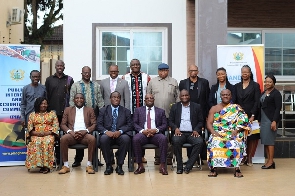 Logo of the Public Interest and Accountability Committee
Logo of the Public Interest and Accountability Committee
A delegation from the Upper House of Parliament from the Republic of Namibia paid a courtesy call to the Public Interest and Accountability Committee (PIAC) in Ghana to understand petroleum revenue management and its maximisation for the benefit of its citizens.
The delegation, which comprised Members of the Parliamentary Committee on Agriculture, Environment and Natural Resources, was led by Mr Elder Filipe, the Vice-Chairman of the committee.
In a news brief signed by Professor Kwame Adom-Frimpong, Chairman of PIAC and shared with the Ghana News Agency in Accra, said the visit was in accordance with Rule 159 of the National Council Standing Rules and Orders of the Namibian Parliament, which mandates the Committee to address matters pertaining to various sectors such as water, agriculture, land, environment, forest, mines, and energy.
Mr Elder Filipe said Namibia had discovered hydrocarbons which needed to be exploited for the benefit of its citizens, and as such it was important to learn from other countries who have a wealth of experience to share in order that the country got it right from the start.
He said Namibia was planning to set up a committee like PIAC to ensure that revenues from petroleum resources were managed and utilised effectively to avoid the resource curse.
Mr Filipe noted that Ghana had been very progressive in the management of its petroleum revenues with the promulgation of laws and necessary institutions to govern operations in the sector.
Professor Kwame Adom-Frimpong said that it was important for the leadership of Namibia to ensure that there was secured funding for the Accountability Committee to facilitate its smooth operation.
He also urged the Parliamentarians to show real commitment towards the work of the yet-to-be-established Committee to help in the implementation of the recommendations it churned out.
Mr Adom-Frimpong expressed the Committee’s willingness to provide technical support to the Namibian counterparts in their attempt to promote transparency and accountability with their natural resource.